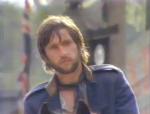AustLit
Film Details - Australian Broadcasting Commission , 1974
Producers:
Production Companies:
Finance Organisations:
Music:
Cast:
Release Dates:
Location:
- Series one: Set in the fictional Crockers Gully goldfield in Victoria in the 1850s (and filmed at Lysterfield, outside Melbourne).
- Series two: Set in the fictional New South Wales mining town of Turon Springs in the early 1860s (and filmed at Belrose in Sydney's north).
Awards:
- Series one: 1974 Logie Award (Best New Talent: John Waters); 1974 National Musical Industry Award (Best Instrumental Performance: 'Theme from Rush'); 1974 Penguin Award (Best Actress: Olivia Hamnett).
- Series two: 1976 Sammy Award (Best Actor in a TV Series: John Waters) and 1976 Penguin Award (Best Actor: John Waters).
- In addition, the episode 'A Shilling A Day' (the final episode of series two) won five individual awards: 1976 Logie Award for Best Script (Drama) (for Colin Free); 1976 Sammy Award for Best Writer for a TV Series (Drama) (for Colin Free); 1976 Logie Award for Best Individual Performance by an Actor (for Hugh Keays-Byrne); 1976 Sammy Award for Best Actor in a Single Performance (for Hugh Keays-Byrne); and 1977 AWGIE (for Colin Free).
Notes:
List of episodes:
Series one
1. Of All The Crowd That Assembled There (Howard Griffiths)
2. They'll Yet Regret (author unknown)
3. They Faced All The Dangers, Those Bold Bushrangers (Sonia Borg)
4. Toe The Scratch And Never Say Die (David Boutland)
5. There's A Change From The Old To The New (John Martin)
6. For That New Promised Land (Cliff Green)
7. Three Cheers For Her Gracious Majesty (James Davern)
8. Lament The Days That Are Gone By (Sonia Borg)
9. Poor John Chow Chow (Oriel Gray)
10. Manners Maketh Man (James Davern)
11. There's A Good Time Coming (Sonia Borg)
12. There's Only You, Mate, And I (Howard Griffiths)
Series two
1. Welcome Back Sergeant McKellar (James Davern)
2. The Great Eastern Bubble (Colin Free)
3. Romany Gold (James Davern and Victor Sankey)
4. The New Golden Mountain (David Boutland)
5. La Belle France (Ted Roberts)
6. Farrar's Pride (James Davern)
7. Live To Fight Another Day (Ted Roberts)
8. I'll See You Dead McKellar (Colin Free)
9. You Just Can't Win (Ted Roberts)
10. The Kadaitcha Man (Ted Roberts)
11. McKellar R.I.P. (James Davern)
12. The Second Oldest Trade (Colin Free)
13. A Shilling A Day (Colin Free)
Note: Don Storey notes that James Davern, the series' producer, often credited his scripts on-screen to his secretary Jennifer Cooley, not wanting it known that he also wrote for the program.
- New South Wales,
- Victoria,



